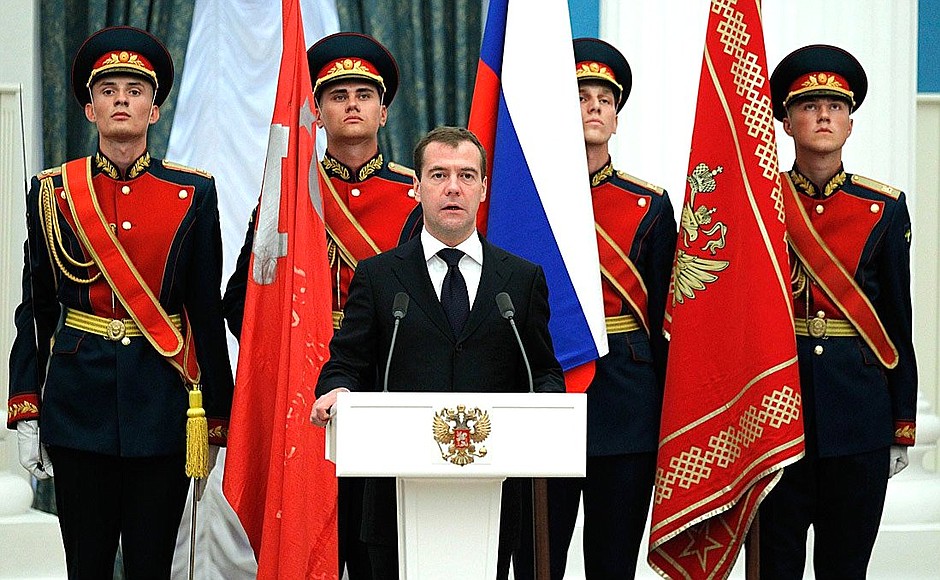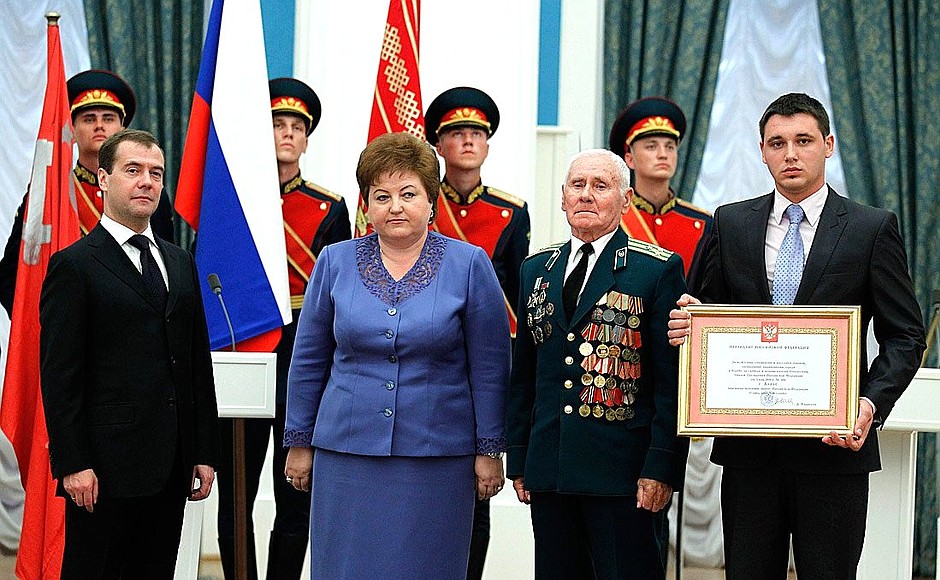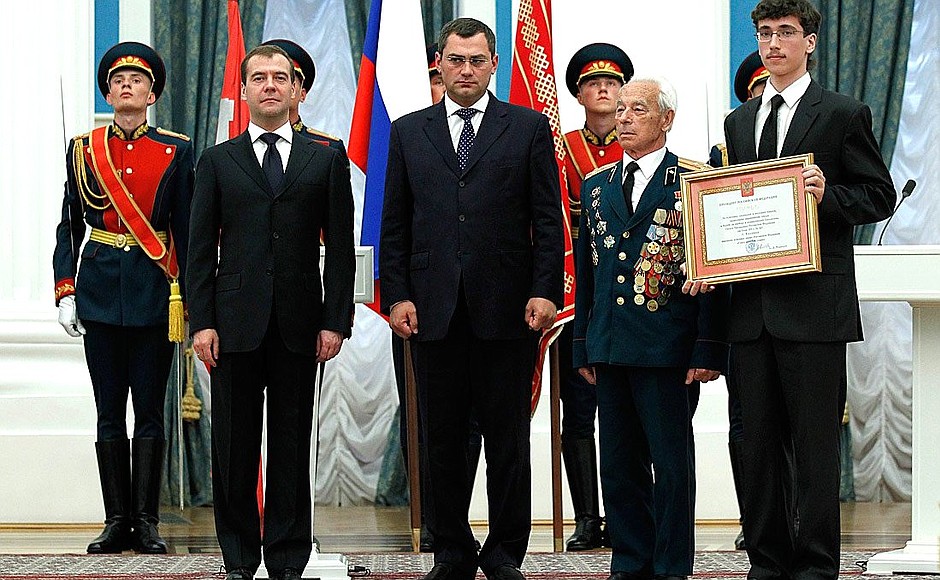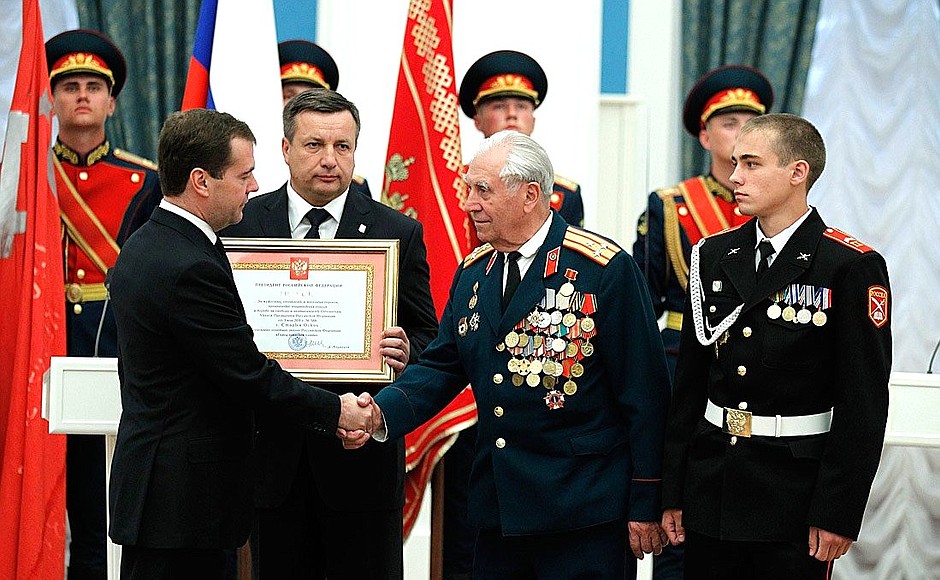Mr Medvedev signed the executive orders conferring the titles on May 5, 2011. To date, 33 towns and cities have received the honorary title.
Earlier in the day, the President commemorated the 70th anniversary of the start of the Great Patriotic War by paying tribute to the memory of the fallen and laying a wreath before the Eternal Flame at the Tomb of the Unknown Soldier.
* * *
Speech at a ceremony conferring the honorary titles of City of Military Glory on Anapa, Kolpino, and Stary Oskol
President of Russia Dmitry Medvedev: Veterans, friends,
Today is a special day in our country’s history. Exactly 70 years ago, on June 22, 1941, the Great Patriotic War began, the most terrible and bloody war in our country’s history. As you know, it lasted 1,418 days, took the lives of tens of millions of people, saw thousands of towns and villages set aflame, and brought sorrow and privation to practically every Soviet family.
Our victory was the result of the great and unprecedented courage our people showed. Each and every one of us today now has a duty to ensure that these feats do not fade with time, are not eroded in any way, and remain preserved for future generations of Russia’s people.
Today, we confer the title of City of Military Glory on three cities: Anapa, Kolpino, and Stary Oskol.
Today, we are conferring this title on Anapa. Back in the nineteenth century, the Anapa Fortress defended our southern frontiers and put up fierce resistance to the invaders during the Russo-Turkish wars. During the first months of the Great Patriotic War, units were formed in Anapa, and were joined by thousands of volunteers, including young people not yet old enough to be called up. During the war, Anapa’s underground movement fought right until the town was liberated, and after the liberation, a large number of hospitals treating soldiers wounded in battle were shifted to Anapa.
Kolpino is another Russian city with many glorious pages in its history. In 1240, at Ust-Izhora, not far from today’s Kolpino, the volunteer army led by the Novgorod prince, Alexander Nevsky, routed the Swedish armies who came to conquer Rus in what history remembers as the Battle on the Neva.
”Our victory was the result of the great and unprecedented courage our people showed. Each and every one of us today now has a duty to ensure that these feats do not fade with time, are not eroded in any way, and remain preserved for future generations of Russia’s people.“
During the Great Patriotic War, Kolpino’s defenders showed that they are worthy of their forebears’ feats. The front line of defence ran just three kilometres from the town. It was here that the soldiers of the legendary Izhora Battalion fought to the death. Neither hunger nor cold could break the townspeople’s spirits, and they defended their homes with great courage. It seems almost impossible to imagine, but the Izhora Plant, where during the war years only women, old men, and children toiled, did not stop working for a single instant, producing supplies for the front without interruption.
We also honour today the city of Stary Oskol. The names of the soldiers who fought in the Stary Oskol Regiment in the 1812 Patriotic War are engraved on marble plaques in the Cathedral of Christ the Saviour in Moscow, and this is not by chance, of course. During the Great Patriotic War, in 1942, fierce battles unfolded around Stary Oskol, weakening the enemy forces, which were at that moment trying to push down towards Voronezh and the Don. Partisans were a real threat to the enemy during the occupation period. After the town’s liberation, despite the great damage its industry had sustained, Stary Oskol’s people fulfilled all the military supply orders, repairing the motor vehicles, tanks and weapons essential for our troops’ offensive in direction of Belgorod and Kharkov.
Friends,
Next year, we will celebrate 1150 years since our state was formed, and 200 years since the victory in the 1812 Patriotic War. Our country is ancient, and at the same time young, and, sadly, has encountered aggression on many occasions, aggression that has caused countless victims, what’s more. We have emerged victorious every time thanks to the courage of our soldiers and those who helped the front.
Once again, I offer my warmest congratulations to the residents of the cities honoured today with the lofty title of City of Military Glory, and propose now that we begin the ceremony.
* * *
Veterans, colleagues,
I have said at past ceremonies conferring the title of City of Military Glory that the conferral of this title symbolises our recognition of the particular services of this or that city, sometimes places that have held a strategic position on our country’s various frontiers over the centuries. This recognition is in itself important, but even more important, perhaps, is that this title’s conferral encourage these cities’ development.
Our attachment to our native towns begins, after all, with memories, with history, and with our special feeling towards events in our towns. I am sure that the local press in your towns will write about this ceremony today, and the veterans will get together and discuss this event too.
I hope very much that the town officials, with the support of the regional governors, do their part to turn Stary Oskol, Anapa, and Kolpino into comfortable places to live, places where glorious history goes hand-in-hand with high living standards and an optimistic mood. This does not depend on Alexander Nevsky or the other heroes who have brought our cities and towns fame in the past, but on us now. This is the task before us today.
I sincerely congratulate you all on the conferral of the lofty title of City of Military Glory, and on this difficult but deeply significant date in our country’s history I wish our dear veterans good health.



